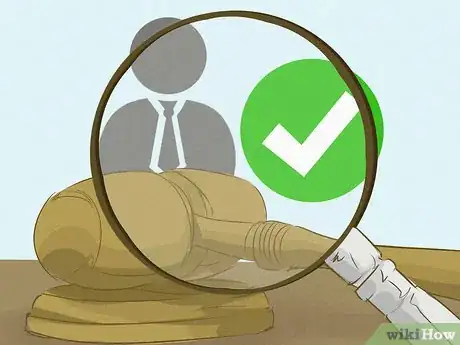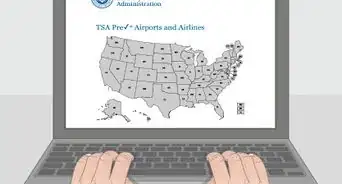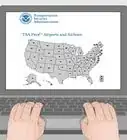This article was co-authored by Clinton M. Sandvick, JD, PhD. Clinton M. Sandvick worked as a civil litigator in California for over 7 years. He received his JD from the University of Wisconsin-Madison in 1998 and his PhD in American History from the University of Oregon in 2013.
There are 14 references cited in this article, which can be found at the bottom of the page.
This article has been viewed 48,907 times.
To one degree or another, we all live in a global community today. And while we’d like to believe that everyone out there is kind and trustworthy, we know that’s not the case. Whether it’s a company that wants to do business internationally, or someone in the midst of striking up an overseas relationship, there are more reasons than ever to gain some insight into just what we may be getting ourselves into. Fortunately, access to international data is more readily available than ever before.
Steps
Establishing the Reasons for a Search
-
1Consider checking on potential new employees to lower the risk for fraud and misrepresentation.[1] You want to make sure the persons you’re hiring really are who they say they are. This applies not only to identity, but also to job qualifications. You may want to conduct background screening for:
- Job candidates from locations outside of the U.S.
- Applicants who have a history abroad.[2]
- Foreign nationals for a position in their home country, if you’re setting up—or expanding—your business overseas.
-
2Investigate someone you met on the Internet. Perhaps you’re involved in a budding cyber romance with somebody from another country. Or maybe you’ve met a prospective foreign business associate online. Either way, you can’t be too careful these days. A background check will at least give you more information on which you can base a decision whether or not to pursue the relationship.[3]Advertisement
-
3Be diligent if you’re preparing for a business merger. Obviously, this is an area where you need to do more than just accept the representations of the company you’re considering merging with. You may choose to forgo a background check on a company you’ve had a solid working relationship with for a long time, but for anything short of that type of close association, doing your homework (beyond just reviewing financial records) could prevent a potential disaster.[4]
-
4Protect yourself against a "negligent hiring" claim. This kind of allegation could arise when a worker causes harm to another individual within the scope of his or her job. If an employer can’t demonstrate that it exercised reasonable diligence when evaluating that individual’s fitness for the job, the employer could potentially be held liable for negligent hiring.[5]
-
5Comply with international regulations. Just as U.S. employment screening regulations vary by industry, state, and federal levels, countries may have their own unique requirements for background screening and how employers are able to seek and use information. Businesses that don’t address in-country regulations through a global screening program risk being out of compliance in that country.[6]
Determining Available Kinds of Background Checks
-
1Learn about criminal records searches. These are helpful to anyone who may have concerns about an individual, either on a personal or a business level. But it’s particularly important to employers, since they have a moral and legal obligation to provide a safe work environment.
- You need to know whether a potential employee has been involved in criminal activity (such as substance abuse, dishonesty, or dangerous and violent behavior).
- This search allows you to determine if an applicant is appropriate for both the job and the particular work environment.[7]
-
2Look into obtaining an international education verification. Again, this is significant when assessing a prospective employee. This kind of background check: confirms the applicant’s claimed education, training, or certification outside the United States; serves as a valuable honesty check; and, helps protect an employer against negligent hiring claims.[8]
-
3Consider doing a search to confirm international employment. A job applicant’s prior history is normally a good indicator of future performance. An employment search can:
- Verify the individual’s title, job tenure, and salary claims.
- Authenticate both the applicant’s stated reasons for leaving and his or her eligibility for rehire.
- Provide an opportunity for prior employers to share their views of the applicant as an employee.[9]
-
4Investigate an international driving record. This search is just about a must-have if you’re planning to hire someone from another country to drive company vehicles or drive on company business.
- It can verify that an applicant has the license required for the position (license type, current status, standing, and restrictions, if any).
- It may supply information regarding an applicant's history of irresponsible behavior, including whether there is a history of substance abuse.
- It can also corroborate name and address information that might be useful if you’re also conducting a criminal record search.[10]
-
5Include a global homeland security search. This particular investigation helps an employer to comply with laws such as the Patriot Act, which was designed to combat money laundering and terrorist financing.
- The law also expanded the range of industries required to conduct such screenings under existing laws and programs.[11]
- Federal law specifies that all individuals and organizations within the United States are responsible for ensuring that they do not undertake business dealings with an individual or entity listed on the Office of Foreign Asset Control (OFAC), Specially Designated Nationals (SDN), and Blocked Persons List.[12]
-
6Request an international business evaluation. If you’re contemplating doing business with an overseas company, obtaining information relevant to this possible relationship is pretty much obligatory. Some of the items you might consider researching are:
- Financial statements
- Legal notices/Public records
- Management information and ownership/corporate structure
- Trade, bank, or supplier references
- Import and export volumes for countries and regions.[13]
Discovering the Right Resources for Your Needs
-
1Contemplate using an international search firm or private investigator. This is not to say you can’t conduct the searches yourself, but using a full-service company or investigator can greatly facilitate the process. Going online will net you plenty of companies who’ll offer to provide an international search, encompassing most—if not all—of the items referenced in Part 2, above.
- Check their websites for company information, such as how many locations they have, and how long they’ve been in business. Plug the company name into a search engine to see if there are any articles or blogs that reference them. Some companies will have links on their website to articles in which they’ve been mentioned.
- Beware of any company or individual claiming to use a global database to compile a comprehensive report. There is no such thing as a global database that can provide all this information.[14]
- Speak with other companies or individuals you know who may have used an international search firm/private investigator in the past. This is usually an ideal way to get past the hype, and straight to the facts.
- If you opt for a private investigator, it's probably best to use one located in the country that the person you're investigating comes from.
- Ask this individual or company for references. See if they're affiliated with any company located in your own country, which may make it easier to assess their credentials.
- Check with the embassy for the country in which the investigator works. See if the country requires private investigators to be licensed, and ask how you can determine whether the individual or company you're thinking of hiring is properly accredited.
-
2Conduct a criminal history search. This could be relevant for many people for any number of reasons, but it’s especially important for employers.
- Whether you’re conducting the criminal search as an individual, or in your capacity as an employer, city police records are the primary source for international criminal records searches.
- One of the inherent problems with international criminal searches is that there’s normally no national source for criminal records. In most nations, you’d have to search each city, state, or province to determine if a criminal history exists. Plus, most international criminal record searches only cover a period of two to three years.[15]
-
3Verify international education credentials. These are checks of the certification, training, or educational claims of an applicant outside the United States.
- Contact the educational institution that issued the degree or certificate, whenever possible. Most international degrees or certificates are verified by the institution’s Admissions and Records Office.
- Some schools have policies prohibiting anyone other than former students from accessing records. Name variations and incorrect/missing student numbers can cause educational records to be overlooked. GPA and honors information isn't commonly provided. Degree requirements may also differ internationally, making it difficult to determine the level of an international degree.[16]
-
4Confirm employment representations. An overeager applicant may be under the impression that a misleading or untrue international employment claim won’t be detected. If an applicant misrepresents his or her employment history, you need to know.
- If possible, you should attempt to verify an applicant’s international employment by personally reaching out to the employer. And don’t rely on the employer contact information provided by the applicant, just in case it’s fraudulent. Try to obtain that information from another source.[17]
- Determine the employer’s policy for verifying employment, and reach out to the individual or department that can help you discover the information you need.
- As helpful as an employment search can be, don’t be surprised if some employers don’t respond. Others may answer you, but will limit the information they’ll divulge.[18]
- Employment verifications are important in establishing a defense if someone files a claim against you alleging negligent hiring. So even if you’re only able to retrieve a small amount of information from a former employer, it helps your cause that you’ve made a good faith effort to authenticate an applicant’s work history.[19]
-
5Validate an international driving record. This is an essential element in building a defense against negligent hiring claims, regarding employees who'll be operating motor vehicles.
- Contact the individual Department of Motor Vehicles or comparable department in the country, state, or province that issues motor vehicle operating licenses.
- Unfortunately, each country has its own rules and regulations as to how records are kept and released, so getting this information can be hit-or-miss. Additionally, issues such as name variations and incorrect or missing license numbers can cause records to be overlooked.[20]
-
6Run a global homeland security search. This type of search checks a compilation of domestic and international sanctions lists. Individuals or organizations included on these lists may be involved in such activities as terrorism, money laundering, illegal imports, fraud against government agencies, violations of federal banking regulations, and drug trafficking.
- A global homeland security search database is compiled from domestic and international sanctions lists. Some of these are:
- Bank of England Sanctions List
- European Union Terrorism Sanctions List
- Fugitive List
- Health and Human Services List
- Interpol Most Wanted
- United Nations Consolidated Sanctions List
- As with most database searches, a global homeland security search is only as reliable as its last update. Agencies that submit information to these lists work at their own pace. There’s no list that includes all individuals or organizations that are suspected of terrorism and crime around the world.[21]
- A global homeland security search database is compiled from domestic and international sanctions lists. Some of these are:
-
7Evaluate a business’ stability. It’s becoming more and more the norm today for businesses to operate on an international level. If you want to check on an overseas business—as to its credit-standing, overall fiscal health, and management—there are companies that provide this service, such as Experian. As always, check the credentials of these providers before using them.[22]
Warnings
- Federal, state, and local laws and regulations are rapidly evolving regarding employer inquiries into, and use of, applicant/employee criminal records. It’s the employer's responsibility to stay current with changing legal requirements.[28]⧼thumbs_response⧽
References
- ↑ https://www.linkedin.com/pulse/20140812181532-278456034-how-to-conduct-an-international-background-check
- ↑ http://www.hireright.com/blog/2012/10/3-reasons-why-all-employers-should-conduct-global-background-screening-international-background-check/
- ↑ https://www.linkedin.com/pulse/20140812181532-278456034-how-to-conduct-an-international-background-check
- ↑ https://www.linkedin.com/pulse/20140812181532-278456034-how-to-conduct-an-international-background-check
- ↑ http://www.hireright.com/blog/2012/10/3-reasons-why-all-employers-should-conduct-global-background-screening-international-background-check/
- ↑ http://www.hireright.com/blog/2012/10/3-reasons-why-all-employers-should-conduct-global-background-screening-international-background-check/
- ↑ http://www.amof.info/i-criminal.htm
- ↑ http://www.amof.info/i-education.htm
- ↑ http://www.amof.info/i-employment.htm
- ↑ http://www.amof.info/i-mvr.htm
- ↑ http://www.amof.info/homeland.htm
- ↑ http://www.universalbackground.com/employment_screening/patriot.asp
- ↑ http://www.experian.com/assets/business-information/brochures/international-profile-ps.pdf
- ↑ https://www.linkedin.com/pulse/20140812181532-278456034-how-to-conduct-an-international-background-check
- ↑ http://www.amof.info/i-criminal.htm
- ↑ http://www.amof.info/i-education.htm
- ↑ http://www.amof.info/i-employment.htm
- ↑ http://www.amof.info/i-employment.htm
- ↑ http://www.amof.info/i-employment.htm
- ↑ http://www.amof.info/i-mvr.htm
- ↑ http://www.amof.info/homeland.htm
- ↑ http://www.experian.com/assets/business-information/brochures/international-profile-ps.pdf
- ↑ http://blog.verifirst.com/blog/bid/305407/Cost-of-a-Background-Check-How-Much-Should-You-Pay
- ↑ http://www.infocheckusa.com/background-check-pricing.htm
- ↑ https://www.linkedin.com/pulse/20140812181532-278456034-how-to-conduct-an-international-background-check
- ↑ http://www.amof.info/elements.htm
- ↑ http://www.amof.info/homeland.htm
- ↑ http://www.amof.info/i-criminal.htm















-Step-1.webp)






















































